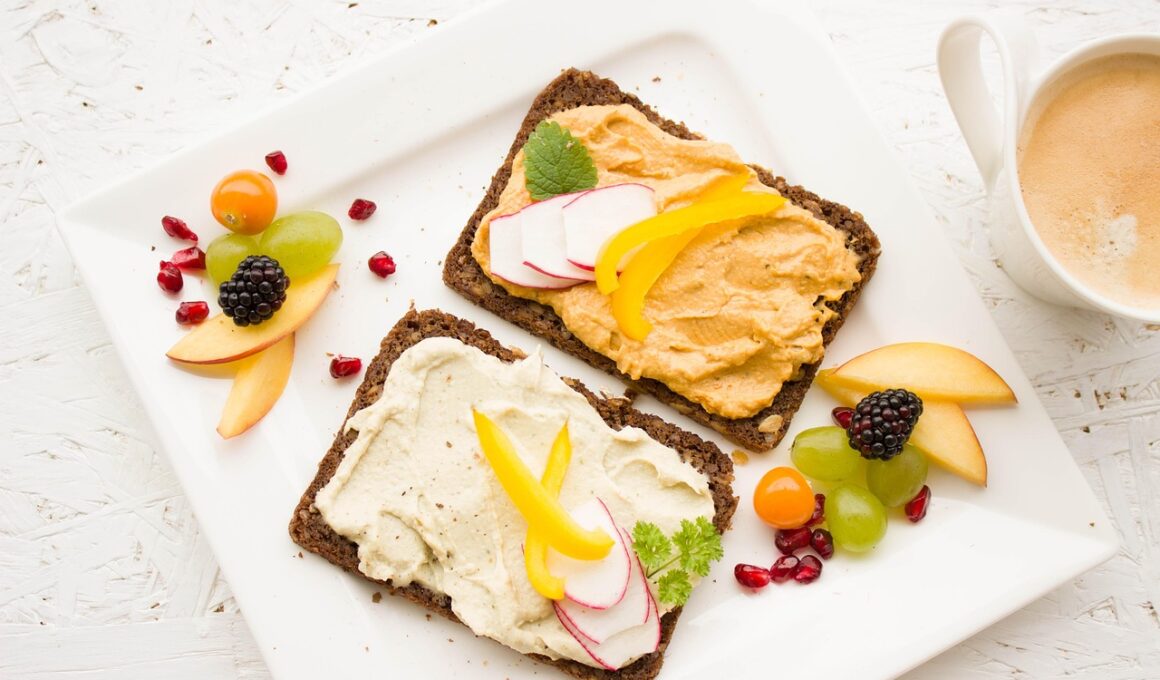Nutrition Label Claims: Sorting Fact from Marketing for Pre-Workout Nutrition
Navigating nutrition labels effectively is essential for anyone looking to refine their pre-workout meals. Understanding how to assess these labels enables athletes and fitness enthusiasts to make informed choices. Firstly, one should look for calorie counts, as these provide a direct measurement of energy intake. Additionally, examine the macronutrient breakdown, focusing on carbohydrates, proteins, and fats. The composition of these elements will significantly affect workout performance. For instance, complex carbohydrates contribute to sustained energy, making them ideal for pre-exercise meals. Also, check for fiber content, which can enhance digestion and provide a slow release of energy during workouts. Beyond macros, evaluating the ingredient list is crucial; prioritize whole-food ingredients over processed options. Analyzing sugar content is also vital, as added sugars can lead to energy crashes. Ultimately, labels should guide you to balance energy needs and performance goals. Using this knowledge can foster better nutrition habits and improve workout efficiency. Prioritize hydration as well, as this complements your pre-workout nutrition, ensuring optimal performance in your routine. With diligence, reading these labels becomes a skill that enhances overall dietary quality.
Another key aspect of reading nutrition labels focuses on checking the serving sizes. Serving sizes can be misleading, often downplaying the true calorie and nutrient density of a product. A single food item may contain multiple servings, so it’s crucial to multiply the nutrient values accordingly. This tactic prevents overconsumption or under-consumption of vital nutrients, thus allowing better dietary control. Moreover, be aware of the % Daily Value (%DV) on labels, as these percentages provide a quick reference on how much a nutrient contributes to your daily diet based on a 2,000-calorie intake. Aim for nutrients marked with a higher percentage that align with your fitness goals. Remember that not all nutrients are created equal; prioritize proteins and carbohydrates over fats when selecting pre-workout meals. Additionally, be cautious of health claims such as ‘low-fat’ and ‘sugar-free,’ as these can sometimes be misleading. Understanding the context behind these claims ensures that you’re making choices that truly support your performance. Brands often use these strategies as marketing tactics, but by focusing on the actual contents, you can sort fact from marketing noise.
Identifying Nutrient Additives in Pre-Workout Foods
While assessing nutrition labels, it is essential to identify any additives that may be present. Ingredients like preservatives, sweeteners, and artificial flavorings are commonly used to enhance taste or shelf life. However, these additives may not contribute positively to your nutrition goals and could potentially harm your health. For optimal performance, prioritize whole, nutrient-rich foods that truly fuel your workout. Ingredients such as oats, nuts, and fruits deliver natural energy and beneficial nutrients without harmful additives. Also, be cautious of proprietary blends, often listed on supplements. These blends can obscure the exact amount of key ingredients, making it difficult to assess their effectiveness. To ensure you’re getting the right dosages of essential nutrients, prioritize products that provide clear ingredient amounts. Furthermore, research any unfamiliar supplements or proprietary blends, understanding their role in pre-workout nutrition. Always remember that quality ingredients enhance not only physical performance but also overall well-being. By being an informed consumer, you can select foods that genuinely support your fitness efforts and help you achieve your goals efficiently.
Fiber is another crucial element to consider when evaluating pre-workout meals. Foods high in fiber can improve digestion and regulate glucose levels, providing steady energy during workouts. However, timing your fiber intake is essential; too much fiber before exercising may lead to discomfort. Aim for a balanced approach by choosing moderately fiber-rich foods to maximize benefits. Also, consider the timing of your pre-workout meal; the ideal time frame is typically one to three hours before exercise. This timeframe allows your body to digest the food adequately, ensuring peak energy availability during your workout. Moreover, consider portion sizes, as what works well for one individual may not be suitable for another. Listen to your body’s signals, adjusting portion sizes according to activity intensity. Combining the right nutrients with appropriate timing significantly impacts your energy levels and overall performance. Incorporating a mixture of carbohydrates and proteins not only fuels your workout but also aids recovery. Therefore, maintaining a flexible strategy that accommodates your appetite and workout schedule will lead to better results in the long run. Remember to stay hydrated as well, complementing your nutrition choices before exercise.
Balancing Macronutrients for Optimal Performance
Achieving the right balance of macronutrients in your pre-workout nutrition can provide significant benefits. Carbohydrates are the primary source of energy during exercise and should comprise the majority of your pre-workout meal. Aim for complex carbohydrates, such as whole grains or legumes, which provide long-lasting energy. Pair these with proteins that support muscle repair and growth, making for a holistic pre-workout meal. Remember to factor in healthy fats judiciously, as they can slow digestion yet supply essential calories. For those engaging in prolonged training sessions, the ratio of these macronutrients may vary. Experimenting with different combinations will enable you to determine which distributes energy best to fuel your workouts. Don’t forget about personal preferences and tolerances; what works for one person may not work for another. Utilize food tracking apps to observe how various macronutrient ratios impact your performance. It will help analyze trends and refine your approach to pre-workout meals. Furthermore, ensure that your meal retains a vibrant balance of colors, indicating a variety of nutrients that promote better overall health and performance. Keep hydration in mind too, as it underpins effective nutrient absorption.
The impact of pre-workout nutrition is significant, which is why it’s imperative to sift through nutrition label information carefully. A well-structured pre-workout meal not only provides the energy needed but also promotes recovery afterward. Be consistent in your approach; gradually adjust your nutrition as you learn what your body needs for optimal performance. Incorporating fruits and vegetables into your pre-workout meals not only boosts vitamins and minerals but also contributes fiber and hydration. Snack options like bananas, Greek yogurt, or smoothies can effectively fuel workouts and provide essential nutrients. Meal timing, food selection, and portion sizes are integral components of effective nutrition strategies. Identify a routine that aligns with your activity level and personal goals. Keep experimenting to determine which meals and snacks resonate best with your body. By dedicated attention to your nutrition labels, you will gain confidence in your food choices. There is also an empowering aspect when you prioritize whole foods and simplify food choices. Armed with knowledge and practice, you can efficiently hit your fitness targets while maintaining a diverse, enjoyable diet. Effective pre-workout nutrition leads to lasting results and improved fitness levels.
Finally, don’t hesitate to consult a nutrition professional for personalized guidance tailored to your unique needs and fitness goals. Every individual’s body responds differently to food, and personalized advice can help you navigate your pre-workout nutrition journey effectively. Dietitians can offer specific recommendations on portions, food choices, and timing based on your body type, energy demands, and fitness level. Furthermore, they can help you interpret labels more accurately without falling prey to marketing gimmicks. Investing in sustainable nutritional habits pays dividends in performance enhancements and overall vitality. Establishing a supportive network, whether through social interactions or online communities, can also help keep you motivated and informed. Sharing experiences and successes can provide valuable insights and encourage adherence to healthy practices. Always remember that nutrition plays a foundational role in achieving fitness goals; a proactive approach leads to profound improvements in both performance and health. As you continue to refine your pre-workout meals, the knowledge gathered from nutrition labels significantly empowers your decisions. Your commitment to smart choices transforms your training, unlocking new levels of potential in your physical pursuits.


